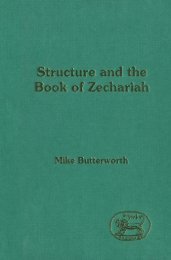Appendix CASE ONE - Collection Point® | The Total Digital Asset ...
Appendix CASE ONE - Collection Point® | The Total Digital Asset ...
Appendix CASE ONE - Collection Point® | The Total Digital Asset ...
You also want an ePaper? Increase the reach of your titles
YUMPU automatically turns print PDFs into web optimized ePapers that Google loves.
James Greenshields and the House of Lords: A Reappraisal 113<br />
Wrongous Imprisonment. 14 <strong>The</strong> magistrates answered that his orders were<br />
invalid and called him a'lay-man' and 'a Landloper from Ireland, pretending<br />
to be a lawful minister'. 15 <strong>The</strong> full bench of the Court of Session ruled against<br />
him on 8 November. <strong>The</strong>n Greenshields put in a reclaiming petition arguing<br />
that his ordination was a new issue, not raised initially by the Presbytery.<br />
This was also rejected and Greenshields presented his 'protest for remeid of<br />
law' on 30 December. <strong>The</strong> 'protest' had a superficial resemblance to the old<br />
form of appeal to the Scottish Parliament before 1707, although by 1709 the<br />
newer Scottish appeals were beginning to adopt English features. 16 This was<br />
the seventh case to go up since the Union; only nine months earlier, the first<br />
instance of a reversal of the Court of Session had occurred. 17<br />
<strong>The</strong> Greenshields petition came up in the House of Lords in February 1710.<br />
<strong>The</strong>re was a considerable amount of interest for such an early stage of an<br />
appeal. <strong>The</strong> motion to send for the proceedings prompted an amendment to<br />
call for transcripts of all orders and for the personal attendance of Greenshields<br />
and some of the magistrates. This in turn produced a division, in which those<br />
seeking the added testimony lost and then lodged a formal protest. 18 A second<br />
motion was then debated, and the House voted to hear the case upon receipt<br />
of the documents. On 17 March the House decided that the case would be<br />
taken up 'as soon as the proceedings on the impeachment of Dr. Sacheverell<br />
now depending are finished'. <strong>The</strong> formal receipt of the Greenshields petition<br />
was recorded on 25 March, and the respondents were ordered to answer by<br />
the opening of the next session. In addition, the order of the House said that<br />
counsel for the respondents 'shall be at liberty, upon the hearing of this cause,<br />
to argue, in the first place, whether the said appeal be regularly and properly<br />
before this house, or not'. 19<br />
<strong>The</strong> hearing was delayed for nearly a year, first for the conclusion of<br />
14 <strong>The</strong> text of the Bill was printed in <strong>The</strong> Case of Mr. Greenshields, 9-12. In an earlier case, one<br />
Adam Peacock was arrested in Stirling in 1704 for intruding into the parish church, being under a<br />
sentence of deprivation by the General Assembly. Peacock raised a process under the Act of 1701 which<br />
failed in part because of the exception in the Act allowing magistrates 'to imprisone parties disobedient<br />
and contumacious to church censures' so long as they had the chance to make bail or demand a speedy<br />
trial. According to Fountainhall, Peacock's was 'the first [case] raised upon that new act of parliament',<br />
Fountainhall, ii, 209; Mor. 17065.<br />
15 Ibid., 52.<br />
16 As David Robertson pointed out a century later: '<strong>The</strong>y were still in Scotland stiled Protestations for<br />
remeid of Law. In Appeals brought after the Union, the form previously used in Appeals from Courts of<br />
Equity in England had apparently been adopted: But the old form of taking a Protest against the decision<br />
of the court, and declaring the grounds of Appeal by an instrument under the hand of a Notary Publick<br />
was continued for a considerable period after the Union. When the effect of an order of the House of<br />
Lords upon a Petition of Appeal came to be generally understood, the Protestations for remeid of Law<br />
were gradually discontinued, and for many years have been wholly left off, Reports of Cases on Appeal<br />
from Scotland (1807), xiv-xv.<br />
17 <strong>The</strong> reversal was in Gray v. Hamilton, in <strong>The</strong> Manuscripts of the House of Lords, vii, cit. sup. n.2,<br />
12; and Robertson, Reports of Cases on Appeal, 1.<br />
18 H[ouse of] L[ords] J[ournals], xix, 68.<br />
19 H.L.J.,xix, 127.






